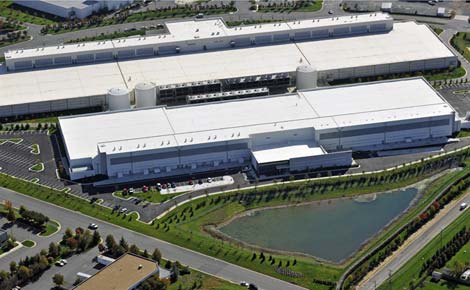
Here's an aerial view of the enormous ACC5 and ACC6 data centers developed by DuPont Fabros. Both facilities house customers in "super wholesale" deals in which a single tenant leases large chunks of data center space. (Photo: DuPont Fabros Technology)
Shares of data center developer DuPont Fabros Technology (DFT) declined today as Wall Street analysts scrutinized lease extensions signed with three of the company's largest customers. Several of the leases were not due to be renewed for three to four years, and the terms of the early renewals - with rental rates about 18 percent lower than the initial lease - caught the analyst community off guard.
DuPont Fabros shares closed at $21.44 a share, down $2.17 (about 9 percent) in trading on the New York Stock Exchange. The company's stock had been 15 percent lower early in the session. The selloff came despite operating results and revenue guidance that were in line with Wall Street expectations.
Investor concerns about DFT impacted several other publicly-held data center developers. Shares of CoreSite (COR) fell 7 percent on the day, while Digital Realty Trust sold off by about 4 percent before recovering to close slightly higher. All three companies are real estate investment trusts (REITs).
DuPont Fabros' decision to pursue early lease renewals, and the ensuing analyst scrutiny, illustrates the challenges that public companies face when seeking to manage development decisions. It also spotlights the growing focus on "super-wholesale" customers - huge cloud computing companies that lease large chunks of wholesale data center space.
"All of these tenants have the capital and size to build their own data centers," said Hossein Fateh, President and CEO of DuPont Fabros. "We have consistently worked with our tenants to provide excellent outsourcing solutions for them."
Renewals Total 24 Megawatts of Space
In its third quarter earnings release, DuPont Fabros (DFT) said that it had extended four leases totaling nearly 24 megawatts of critical load, or about 150,000 square feet of data center space. In each case, the new leases extended the tenant commitment by four to five years.
The company didn't identify the tenants, but an analysis of the leases and buildings suggests that they are Microsoft, Rackspace and Facebook.
"We thought, rightly or wrongly, that we would give the market comfort that our largest tenants are here to stay," said Fateh. "There have been a lot of theses about 'your tenants are leaving.' Now we can say 'our tenants are staying, and here are their rents.'"
Concern About Rates, Not Relationships
Instead of taking comfort in the longer revenue commitments from key customers, securities analysts expressed concern about the pricing on the lease extensions. Fateh said the lease rates were consistent with terms of super-wholesale leases, typically large deals with marginally lower returns than smaller leases. Although the rates were lower, he said,the company's profit margins were effectively the same because the deals involved no brokerage fees or additional capital costs.
But analysts wondered whether the lower rents would set a precedent for other leases and renewals, or perhaps reflected a lack of faith in future pricing trends. Fateh said the terms for the renewals, which represent 14 percent of DFT's annual revenue, were not representative of its broader portfolio. "We gave away some cash rent to get the extensions," he said. "We felt that was important to do to keep our long-term tenants."
Fateh noted the challenges of keeping investors happy, which he said influenced at least one of the lease renewals. "If we were a private company, I would have waited a few years (to renew)," he said.
Building Big
One of the reasons for the close analyst scrutiny of DuPont Fabros' quarter-to-quarter leasing is the company's strategy of building large blocks of data center space - as much as 18 megawatts in current designs. That places pressure on the company to lease up that vacant space. The company currently has projects in New Jersey and Santa Clara, Calif. that are less than 45 percent leased.
Fateh has often noted the "lumpy" nature of data center leasing, particularly with high-growth Internet tenants whose requirements evolve quickly. The large builds allow DuPont Fabros to fill data centers very quickly when a large client needs space, as has consistently been the case with its northern Virginia properties. Thus far, 2012 has been one of the company's most successful leasing years to date, with more than 28 megawatts of new leasing and 24 megawatts of renewals over the first three quarters of the year.
Fateh says the company is seeing lots of activity in Santa Clara, and expects to have no problems leasing that facility by mid-2013. New Jersey "is the one market that's taking longer than expected," he said.
DuPont Fabros is changing tactics in one area. It will now build its space in smaller increments to manage capital more efficiently.
"We have figured out a way to build in smaller chunks and keep our (current) design," said Fateh, who said DFT's future expansions will come in 4.5 megawatt or 9 megawatt increments, instead of the 18 megawatt spaces the company finished in New Jersey and Santa Clara.





